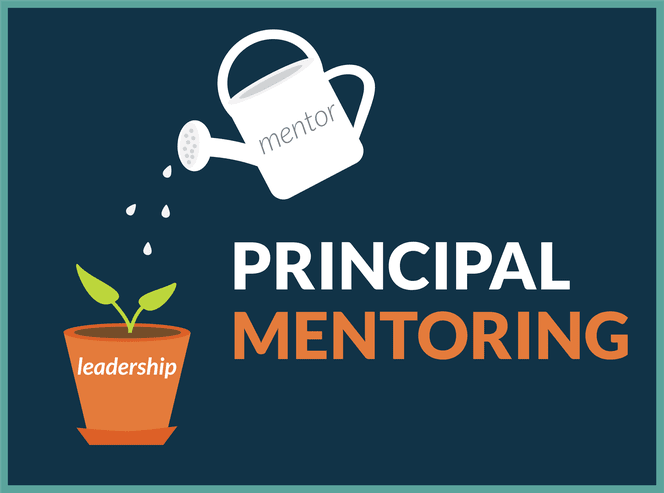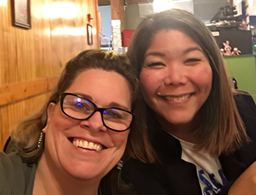
Association of Washington School Principals
Volume 1 – 2020-21

Principal Mentoring
What a Great Idea!
Developing, supporting, and retaining new principals
Kelly Sheward
Principal, Marshall Elementary, Marysville SD
Evaluation Criteria: Creating a Culture, Managing Resources

Mentor Kelly Sheward with mentee Alene Arakawa
Principal mentoring is a relatively newer practice taken from the concept from the Beginning Educator Support Team (BEST) Mentoring program for teachers. The BEST is one way new teachers in Washington are provided support through comprehensive induction. The goal of the program is to support and retain new teachers and ensure an equitable, high-quality education for every student in Washington. When we set up our novice teachers for success, we set up their students for success.
As stated in the description of the BEST Mentoring Program, the purpose is to support and retain new teachers. But what about principals? AWSP has taken this concept and has applied it to supporting new principals. Principal mentoring can support the development of novice school administrators as instructional leaders and increase principal retention, as well as contribute to greater stability in school reform efforts over time. Principal mentoring is critical because the principalship has evolved into one of the most challenging positions in public education. There is an increasing demand for the principal to oversee school safety, be an instructional leader focused on student performance, and manage complex school communities.
I am lucky to be an elementary principal in the same district for the past 18 years and the same school for the past eight. However, in looking around, this is not the trend. In Marysville alone, over the past five years, principal retention for elementary schools is 80%, which does not seem so bad. However, that means every year we are losing 20% of principals, which equates to 10 principals.
Giving Back
In seeking my next professional challenge in my career, I decided that I needed to give back. We had no principal mentors in Marysville, other than veteran principals that would occasionally call the new principal and see how they are doing. I decided to get trained through AWSP to be a principal mentor. This was an amazing experience and I learned that being a principal mentor is more than the occasional phone call to check-in. Our new principals need so much more support, as being a principal is a hard job!
With a successful mentoring year, learning and growing, for both my mentee and myself, I questioned, what was next? In working with my supervisor and the support from AWSP, mentoring for the second year would look a little different. With a goal of building the capacity of principal mentors, I would be a mentor to another principal, who would in turn be mentoring a new principal. In addition, I would mentor the two new principals in their second year.

Principal mentoring can support the development of novice school administrators as instructional leaders and increase principal retention, as well as contribute to greater stability in school reform efforts over time.

Developing
In creating a principal mentoring plan, I asked my mentees to complete a survey on their thoughts on the following principal issues:
- Feelings of frustration caused by parents
- Feelings on being dismayed by conflicts with teachers and parents
- Feelings on working with disadvantaged population and community
- Feelings of frustration with system-level issues related to policy
- Feelings of navigating the political climate
- Feelings on your working conditions
- Feelings of not being supported
- Feelings of not being prepared to lead the school
- In what ways do you want to grow professionally
- Systems Domain (vision, communication, data, safety, operations)
- Learning Domain (reflection, curriculum, instruction, assessment)
- Culture Domain (Relationships, wellness, equity, traditions, ethics)
- Personal Intelligence (wellness, self-management, growth mindset, innovation)
- Social Intelligence (Service, community building, capacity building, influence)
- Systems Intelligence (Mission/vision, teaching and learning, operations, cultural responsiveness)
Supporting
Based on the data from the survey, I made a plan to support the new principals in carrying out the district directives, policies, procedures and programs. I also made a plan to support the expectations of principals to be proficient at all responsibilities to ensure a safe, academically successful and efficient school. In addition, I planned to support the principals in:
- “Situational Awareness” — the day to day emotions and feelings of their schools
- “Monitoring/Evaluation” — the ability to monitor practice in place and their relationship to student performances
- “Resources” — providing teachers with materials and professional development necessary for the successful execution of their jobs.
Goal Setting
I made it a goal to be a principal mentor that is confidential; obtains a professional relationship that is individualized; is one-on-one, job-specific; and focuses on the challenges being faced by principals today in a neutral, non-evaluative, risk-free environment. A principal mentor needs to be current, relevant, timely, and focused.
I also aim to be a principal mentor that provides support and guidance to the principal so they may reach their potential as a leader, enjoy working as a principal, be able to tackle issues of the day, and ultimately, improve student performance.
Retaining
Just as every student has specific learning needs, so do principals. I learned through the principal’s self-reflection and discussion that one of the principals wanted/needed to identify and grow her personal leadership skills, while the other principal wanted/needed to evaluate the current systems already in place at her school, collect data around behavior, and start implementing new systems as needed to improve student learning.
As a principal mentor, I introduced a text for the professional focus of each principal to be used as a guide in supporting their areas of need for growth. For the principal mentee who wanted to grow her personal leadership skills, I used the book, “Strengths-Based Leadership,” by Tom Rath. For the principal mentee who wanted to better understand the systems within her school, I used the book, “The Best of the Marshall Memo,” by Kim Marshall and Jenn David-Lang.
We met throughout the year and used the books as resources to better understand the problem of practice and how to approach an action plan to achieve their leadership goals. Our mentoring sessions consisted of establishing guidelines for conversations, debriefing current issues, goal setting, focusing on best practices, and using words of encouragement.
As my principal mentoring journey is heading into the last few months of the school year, I believe my mentees and I have achieved more than our goals — we achieved a professional relationship and a trusting friendship that will last beyond this school year.
Together, we can! ◼
Resources:
OSPI (https://www.k12.wa.us/educator-support/beginning-educator-support-team)
Rath, T. (2008) Strengths Based Leadership. New York, NY: Gallup Press
Marshall, K. & David-Lang, J. (2019) The Best of the Marshall Memo. Rhinebeck, NY: Epigraph Books.
Hausner, L. (2018) The Principal Coaching Model, Lanham.Boulder.New York.London: Rowman & Littlefield
Find us on
Association of Washington School Principals
Washington Principal | Volume 1 – 2020-21

